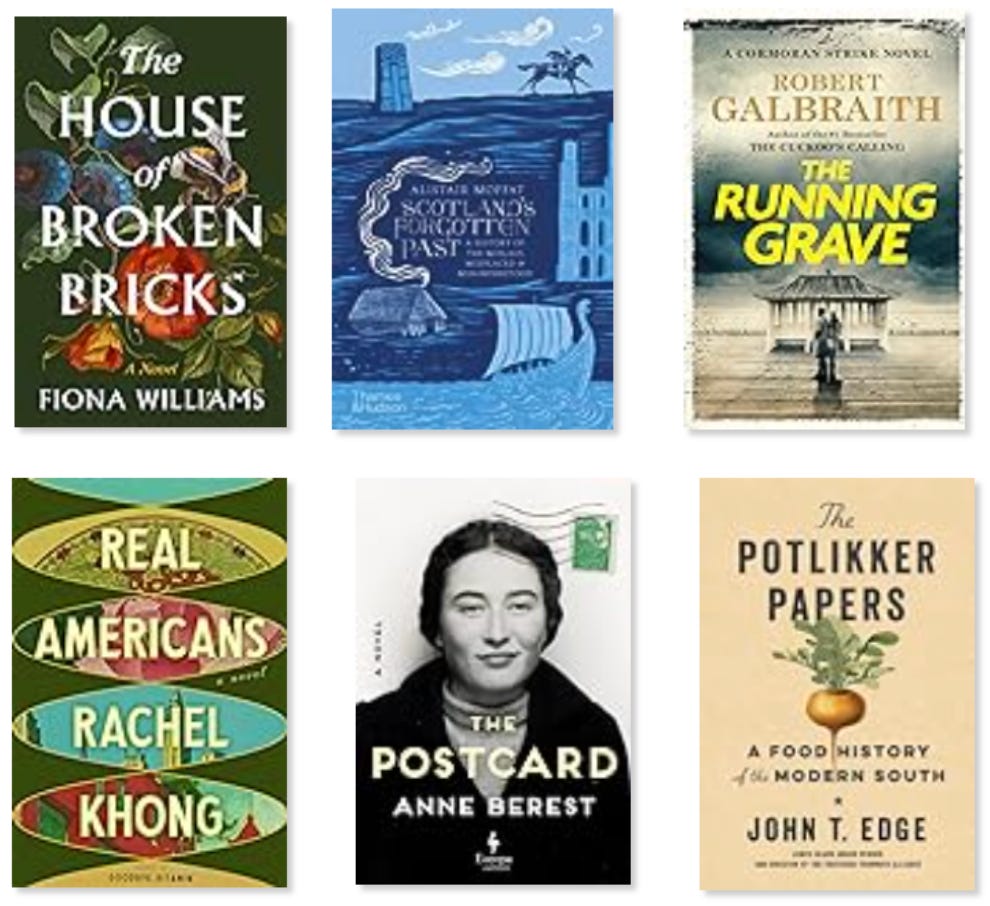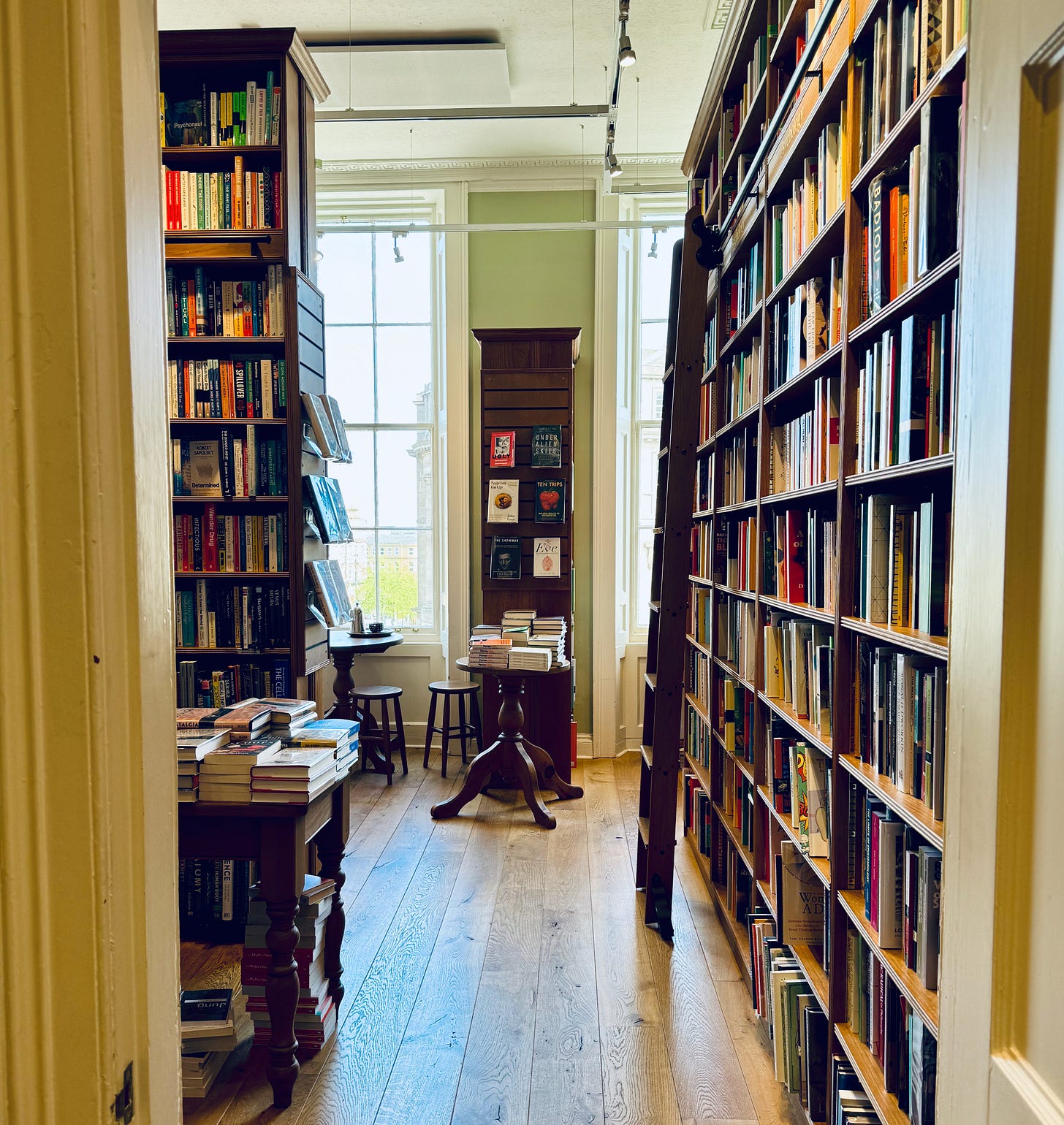This newsletter is quickly becoming one of my favorite things I write each month — not because the writing is any good at all, but because there’s nothing better than thinking back over a good month of reading. I hope these recommendations are still interesting to all of you (or even just some of you). If you’ve picked up a book based on a recommendation here, consider sharing in the comments. It’ll make me feel like I’m performing a public service.
Books I loved
“Real Americans,” by Rachel Khong: Rachel Khong is my writing idol. She’s the author of two novels — “Real Americans,” which just came out, and “Goodbye, Vitamin,” which was published in 2017 — and she also writes nonfiction, primarily about food. In short, she’s living my dream life. (Do any of you ever play that sick game where you stumble upon someone whose career you emulate, and you calculate what age they were when they accomplished various things, and then you look at your own life and get dizzy? Rachel Khong is only three years older than I am, and look at everything she’s done.)
Wait, sorry. You’re here for book recommendations, not existential dread. In that case: I listened to Khong on the “Longform” podcast last month, was inspired b y almost everything she said, and immediately picked up “Real Americans.” It was nothing like what I expected, and it was even better than I’d expected it to be. The story shifts between three narrators of three different generations in the same family, and Khong does an incredible job of making each voice believable, distinct — and yet clearly related to the others.
“The Postcard,” by Anne Berest: I’d seen the haunting cover of “The Postcard” probably 100 times before I finally picked the book up at Athenaeum Boekhandel, a bookstore in Amsterdam with a large selection of English-language books. That day, I read the first chapter while standing in the corner of the store, and as soon as I got back to the country, I picked up a copy of “The Postcard” from the library and read it in a matter of days. It’s a haunting story — a novel based largely on true events — of a family’s search for its history, which was largely destroyed in the Holocaust. The central mystery is a postcard, which arrives at the narrator’s mother’s home, and throughout the book, it felt impossible that they’d answer the question of who sent it, and why. I won’t spoil anything, but I will say that the book’s resolution was pretty perfect.
“The Running Grave,” by Robert Galbraith: I’m caught up on all things Cormoran Strike, which means I’m simultaneously detesting J.K. Rowling after reading this excellent profile of Daniel Radcliffe in the Atlantic and rooting for her to finish the next installment in this series. (There are a lot of good arguments for and against engaging with Rowling’s work, and for now, I’m going to apply what Radcliffe said about Harry Potter to this series, too — and I’ll keep relying on the library rather than buying these books.) That said, “The Running Grave” may be my favorite Strike book yet, and I never wanted it to end. I also could not put it down. To the point that I wasn’t getting any work done. At one point, I gave up and spent an afternoon reading rather than writing. there was just no way I was going to be a productive member of society again while waiting to find out how Strike and Robin took down an evil cult.
A book I only read because I went to Scotland
“Scotland’s Forgotten Past,” by Alistair Moffat: Most of my knowledge of Europe has been gleaned through decades of reading historical fiction — some of it smut, some of it literary. (I could write 10 newsletters about Philippa Gregory’s influence on my perceptions of the British monarchy. I promise I won’t.) The happy consequence of all that reading is that when I travel, I usually have a pretty good, if dramatized, grasp of the place I’m going and how it got to be the way it is. Scotland, however, was a total blind spot.
When I got to Edinburgh in late April, the extent of my knowledge of Scottish history came from a book or two about Mary, Queen of Scots. I was clueless. My parents booked a day trip with a lovely tour guide, who took us to some fishing villages and abbeys near Edinburgh and then on to St. Andrews, and my mind was boggled by how much I didn’t know. Matthew, the lovely tour guide, kept referencing the Highlands clearances and Robert the Bruce, and I had only a vague idea what he was talking about. Fortunately, the greatest bookstore on earth (that might not be an exaggeration) was about a block from our hotel. That’s where I picked up this book, which is a series of nonfiction vignettes about noteworthy and often bizarre events in Scottish history. It’s not comprehensive, but if you’re headed to Scotland anytime soon and as clueless as I was, it’s a great primer.
Books I really liked
“The House of Broken Bricks,” by Fiona Williams: At first, I struggled to make it past page 20 of this book, which I think was more a problem of circumstances than it was one of storytelling; I started reading it while on vacation, and I was too tired at the end of each day to muster more than a page. But when I finally sat down and gave it a fair shot, I was on page 100 before I knew it.
The storytelling is sublime. The descriptions of food and plants were so vivid I had to blink myself back into place every time I looked up and found myself sitting in my own living room, not roaming the British countryside. And each character’s emotions were so real and so perfectly understated.
“The Potlikker Papers,” by John T. Edge: My resolution as an aspiring food writer is to always be reading one book about food, whether it’s a memoir, a cookbook or something narrative and reported, like “The Potlikker Papers.” This book traces the history of the modern South through the lens of food. It’s comprehensive, well-reported and a gold mine for potential story ideas — and it intensified my quest to convince my husband to let us move to New Orleans.








Currently in the midst of Real Americans, and it is excellent. Picked up The Upstairs Delicatessen not too long ago based on your rec, and am looking forward to reading it soon!
Well said.